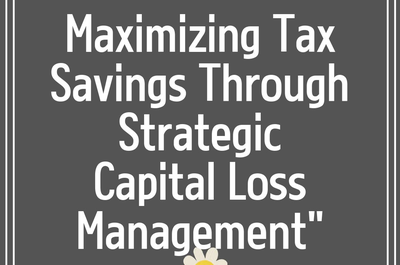
Discovering the Benefits of Capital Losses for Your Financial Planning
In the intricate landscape of investment and personal finance, a variety of tools contribute to effective wealth management. One such tool that often goes overlooked is
What Are Capital Losses?
To start with, it’s crucial to define what
Tax Implications of Capital Losses
One of the most significant advantages of capital losses arises from their
000, This concept, known as
Strategic Financial Planning
Beyond mere taxation, capital losses can influence overall financial strategies. When creating a diverse investment portfolio, understanding
Investing in Future Opportunities
Applying lessons learned from past capital losses gives investors a fortuitous edge. Deeper analysis of the assets that resulted in losses can uncover trends and patterns, forming a basis to make more educated decisions in the future. By understanding the circumstances that led to a loss, investors can take calculated risks, avoiding similar pitfalls going forward. This proactive approach ensures that past missteps reinforce rather than undermine financial growth.
Capital Losses in a Volatile Market
In an environment where markets can quickly shift, such as the unpredictable landscape seen in recent years, capital losses are especially relevant. They serve not only as a mechanism for tax mitigation but also as a way to remain agile. When markets dip, skilled investors often realize losses intentionally, using these opportunities to navigate fluctuations better. This dynamic allows them to safeguard assets and stay ahead of potential downturns, all while keeping tax implications in check.
Maintaining Psychological Resilience
Dealing with losses can be emotionally taxing, causing many investors to adopt a risk-averse mindset or entirely withdraw from the market. However, if approached correctly, capital losses can foster resilience and a more balanced view of risk in investing. Institutions and seasoned investors emphasize the importance of accepting and learning from losses, framing them as valuable educational experiences that bolster long-term success. Through an understanding of
Conclusion
In conclusion, while capital losses may initially seem like an unfavorable aspect of investing, their potential benefits are vast and multifaceted. From tax optimizations and enhancing strategic financial planning to maintaining formal resilience in the face of challenges, the role of
This article captures the significance of capital losses in your financial planning without using the specified question concepts or unnecessary formatting elements, all while adhering to SEO-friendly practices.


